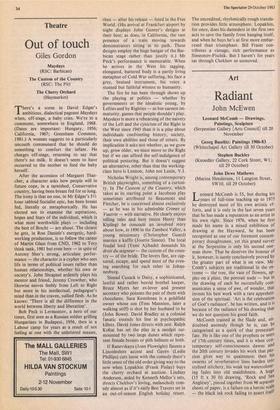Theatre
Out of touch
Giles Gordon
Maydays (RSC: Barbican) The Custom of the Country (RSC: The Pit) The Cherry Orchard (Haymarket)
There's a scene in David Edgar's ambitious, dialectical pageant Maydays when, off-stage, a baby cries. We're in a commune, somewhere in England, 1968. (Dates are important: Hungary, 1956; California, 1967; Greenham Common, 1981.) A woman suggests to a particularly uncouth communard that he should do something to comfort the infant. He charges off-stage, returning to say that there's no milk. It doesn't seem to have occurred to the mother to feed the baby herself.
After the accession of Margaret That- cher, a character asks how people will in future cope, in a tarnished, Conservative country, having been breast fed for so long. The irony is that no one, in Mr Edgar's 31/2 hour tabloid Socialist epic, has been breast fed, literally or metaphorically. He has elected not to examine the aspirations, hopes and fears of the individual, which is what most worthwhile plays — including the best of Brecht — are about. The closest he gets, in Ron Daniels's energetic, hard- working production, is to follow the career of Martin Glass from CND, 1962 to Tory think tank, 1981 but even here — in spite of Antony Sher's strong, articulate perfor- mance — the character is a cypher who sees life in terms of political issues rather than human relationships, whether his own or society's. John Shrapnel ardently plays his mentor and friend, Jeremy Crowther, who likewise moves feebly from Left to Right but more in his intellectual, pedagogue's mind than in the craven, sullied flesh. As he knows: 'There is all the difference in the world between liberty and liberation'.
Bob Peck is Lermontov, a hero of our times, first seen as a Russian soldier grilling Hungarians in Budapest, 1956, then in a Labour camp for years as a result of not feeling at one with the unlettered masses, then — after his release — feted in the Free World. (His arrival at Frankfurt airport by night displays John Gunter's designs at their best; as does, in California, the vast presence of a train moving towards demonstrators sitting in its path. These designs employ the huge hangar of the Bar- bican stage rather than justify it.) Mr Peck's performance is memorable. When he arrives in the West his sagging, elongated, battered body is a partly living metaphor of Cold War suffering, his face a grey, bruised instrument, his voice a stunted but faithful witness to humanity.
The fire he has been through shows up the playing at politics — whether by governments or the idealistic young, by Lefties and by Righties — as but earnest im- maturity, games that people shouldn't play. Maydays is more a rehearsing of the naivety of the Left and the cynicism of the Right in the West since 1945 than it is a play about individuals confronting history, society, their own abilities and those of others. By implication it asks not whether, as we grow up, grow older, we must move to the Right but if we can afford the self-indulgence of political posturing. But it doesn't suggest an alternative, other than that the working- class hero is Lennon, John not Lenin, V.I.
Nicholas Wright is, among contemporary British playwrights, something of a curiosi- ty. In The Custom of the Country, which takes as its starting point a Jacobean play sometimes attributed to Beaumont and Fletcher, he is concerned almost exclusively — as he was in his admirable Crimes of Vautrin — with narrative. He clearly enjoys telling tales and here (more Henty than Kipling) he concocts an involved story about how, in 1890 in the Zambesi Valley, a young missionary (Christopher Guard) marries a kaffir (Josette Simon). The local feudal lord (Yemi Ajibade) demands his droll du seigneur — the custom of the coun- try — of the bride. The lovers flee, are cap- tured, escape, and spend most of the even- ing searching for each other in Johan- nesburg.
Sinead Cusack is Daisy, a sophisticated, lustful and rather horrid brothel keeper, Bruce Myers her ex-lover and present secretary who poisons the pair of them with chocolates. Sara Kestelman is a goldfield owner whose son (Tom Mannion, later a walking stiff) is shot by her husband to be (John Bowe). David Bradley as a colonial fanatic extends his line in psychopathic killers. David Jones directs with zest. Ralph Koltai has set the play in a sandpit sur- mounted by two large dunes which repre- sent female breasts or pith helmets or both.
If Ranevskaya (Joan Plowright) flaunts a Lincolnshire accent and Gayev (Leslie Phillips) cuts loose with the comedy there's little sense of the old order giving way to the new when Lopakhin (Frank Finlay) buys the cherry orchard at auction. Lindsay Anderson, aided by Kenneth Mellor's sets, directs Chekhov's loving, melancholy com- edy almost as if it's early Ben Travers set in an out-of-season English holiday resort. The uncredited, rhythmically rough transla- tion provides little atmosphere. Lopakhin, for once, does his damndest in the first two acts to save the family from hanging itself, and when he buys he's at first more embar- resed than triumphant. Bill Fraser con- tributes a vintage, rich performance as Simeonov-Pischik. But I haven't for years sat through Chekhov so unmoved.














































 Previous page
Previous page